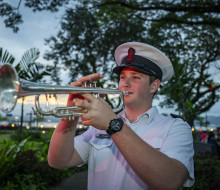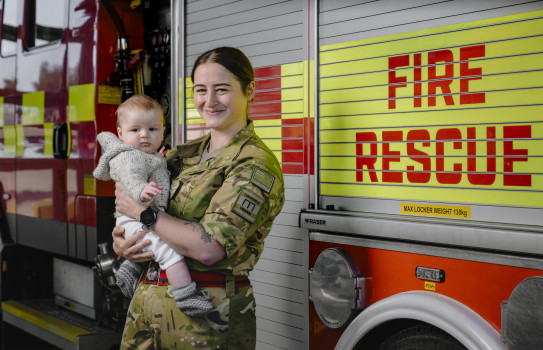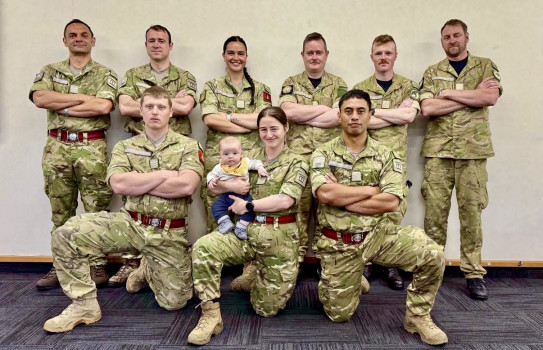
Taupō trumpeter in demand in brand new career with Royal New Zealand Navy Band
26 August 2025
Unfortunately you are viewing this website on an outdated browser which does not support the necessary features for us to provide an adequate experience. Please switch to a modern browser such as latest version of Google Chrome, Mozilla Firefox, Apple Safari or Microsoft Edge.
Ngā mihi nui
Leading a shift, providing advice and support, commanding incidents during a multi-agency response and acting as a Rural Fire Officer are just a few of the responsibilities of our Senior Station Officers within the NZ Army Emergency Responder trade.
Training is essential and when Burnham Emergency Responder Corporal Molly van der Hoek recently completed the ‘Fire Command and Control Senior’ course she was only two months postpartum with her first child.
“Balancing breastfeeding and expressing milk with the demands of the course was the biggest challenge – it took support and a bit of creativity to make it all work.”
Despite juggling life with a newborn, New Zealand Defence Force (NZDF) policy allowed for her to temporarily come off parental leave to attend and complete the course.
The senior trade course for our Emergency Responders, which typically runs every two years, covers a breadth of knowledge including legislation, analysis of case studies, Emergency Operation scenario training and a variety of assessments at the Fire and Emergency National Training Centre.

Corporal Molly van der Hoek with son in front of a fire truck.
CPL van der Hoek knew that with the right planning and support, she would still be able attend the course – despite just having a baby.
“It was important to me not to let timing prevent me from progressing in my career. I knew the NZDF, my family and I had what it took to make this work – I just needed a solid plan,” she said.
Corporal van der Hoek, who joined in 2015, loves the variety her job as an Emergency Responder gives her every day.
“My job means that I am able to meet new people, solve problems, support our community, and work closely with units, especially infantry, during their live field firing Tekapo and Waiouru.
“I enjoy thinking outside the box, driving fire appliances, pushing others to realize their potential, and getting stuck into soldiering. Being a firefighter in the Army combines all the things I value – teamwork, challenge and purpose.”
Strong backing and support from her husband, Regimental Sergeant Major, and the Senior Fire Instructor mean that they were all able to come up with a plan that allowed her to attend the course.
NZDF policy allowed her to pause her parental leave, have a caregiver for her baby with her throughout the course, and was allowed the time for breastfeeding and expressing during course hours. She was also provided with furnished, self-catered accommodation in all three locations the course took her.
Corporal van der Hoek said she now qualified to confidently operate in leadership roles at large-scale incidents.
“This could mean managing a sector during a major vegetation fire, like the Port Hills, leading multiple crews at a complex structure fire, or working in an Emergency Operations Centre in a key leadership role during an event like the Buller floods.
“This was also my final trade course as an Emergency Responder – completing it has represented a major milestone in my career,” she said.

Corporal Molly van der Hoek with son and some of her classmates
This was also the first iteration of the course which had female graduates, making both CPL van der Hoek and an Air Force colleague the first females in the fire trades for Army and Air Force to be trade qualified at this level.
She said the support she received before and during the course made her feel valued by the organisation.
“The support to attend the course has meant that I was able to confidently pursue both my personal and professional goals.
“I’ve had incredible support from my Commanding Officer who backed me from the start, and the command team at the School of Military Engineering who took the time to read and understand the policy and advocate for my inclusion.
“And the support from my husband’s unit, 2/1 RNZIR, who enabled him to work remotely and partly outside of standard working hours so he could come and be the stay-at-home dad while I was on course.”
CPL van der Hoek said she wanted to prove that becoming a Mum didn’t mean the end of your career.
“I also wanted to set an example for my son that if you want something in life and are willing to put in the work, you can achieve it.”
She said the most challenging part was managing the unpredictable – things that were outside of her control.
“I was worried about what would happen if my son got sick for the first time, or if his sleep schedule suddenly changed.”
Corporal van der Hoek said those in the same position should look at how this might work for them too.
“The nature of the course meant I could complete it with baby in tow – not all courses can facilitate this, but anyone can make a situation work with a solid plan and the right backing. With the right support it is absolutely achievable.
“My case is an example of the organisation going the extra mile to retain parents. Plus, your instructors and class mates will never shy away from baby cuddles.”
Having successfully completed the course now means that she is ready for her Senior Non-Commissioned Officer promotion course which she hopes to complete when she returns from parental leave later in the year.